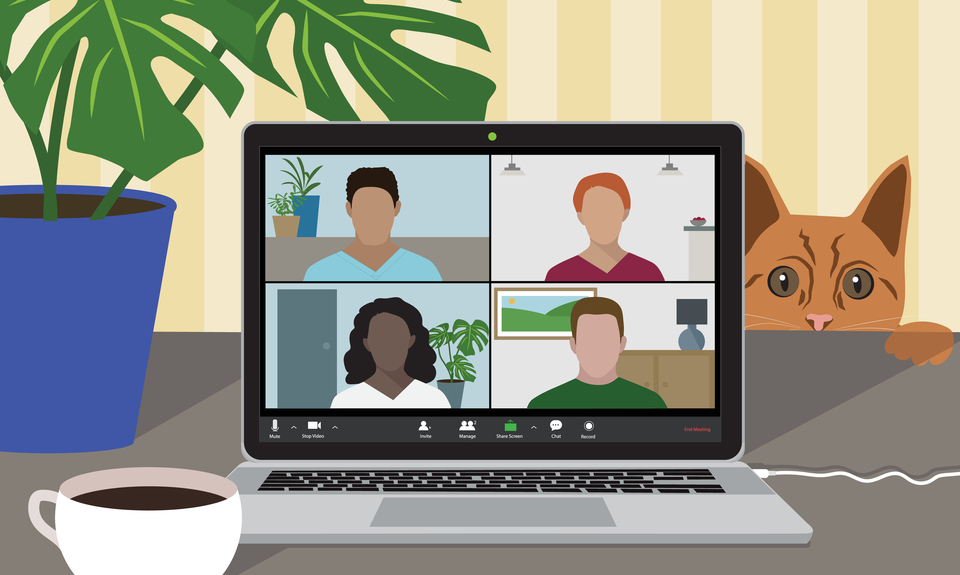The Covid-19 pandemic crisis is affecting our ways of living, travelling, and working. In conditions of lockdown and gradual reopening of businesses, companies around the world had to rapidly deploy large-scale remote work solutions wherever possible and even where it was previously thought to be unfeasible. Leaders’ vision and ability to anticipate the future are brutally challenged by the volatility, uncertainty, complexity, and ambiguity (VUCA) that have suddenly become a harsher reality than ever. In this VUCA world and the unprecedented rise of teleworking that is here to stay, there are signs that a number of employers resort to enhanced digital surveillance, arguably to prevent employees from slacking and to improve productivity. But are leaders at risk of jeopardizing their mission and purpose by micromanaging employees? What are the potential consequences and how can these be addressed?
Remote work: Janus faced?
Surveys show that both employees and business leaders agree telecommuting is beneficial for work-life balance, efficiency, engagement and productivity. Employees also enjoy greater autonomy over the management of their work and other responsibilities. They seem to be able to focus better and avoid interruptions from colleagues. Thus, about half expect to work more flexibly in the UK after the end of the lockdown and up to 88% of the respondents in France wish to continue teleworking occasionally or on a regular basis. Many companies also require staff to continue working remotely for the time being and some, like Twitter, decided to make this opportunity permanent.
However, the downsides of telecommuting continue to emerge. Employees suffer from increased workloads and longer working days, e.g. an extra hour per day in Belgium, Denmark and Austria, two hours in France, Spain, the UK and Canada, and three hours in the USA. Higher pressures to be available and fear from redundancy prevents employees from switching off from work and enhances presenteeism. More meetings and “e-Taylorization” resulting in repetitive and unpleasant tasks that employees feel should be done differently could increase psychological risks if management practices are not adapted to this new normality. Transforming homes into workplaces, thus blurring the professional and personal life boundaries, can also result in feelings of isolation and anxiety. Managing children and domestic chores whilst trying to remain productive at work taxes the mental health of employees. Resolving conflicts with colleagues and superiors is also more challenging when working remotely.
Communicate! – but how and how often?
To secure high performance, business leaders are advised to communicate to yield engagement, but the positive outcomes of digital communication are likely to depend on its frequency, type and quality. Companies have been using Zoom and other videoconferencing software massively during the lockdown, leading to “Zoom fatigue” which scientist attribute to the specificities of such tools that create unnatural and unsettling exchanges. Such exchanges are plagued with “creepy” prolonged stares, lack of synchrony with the others’ emotions, technical glitches, perceptions of threat and obligation to keep the gaze on the screen to avoid being considered impolite or distracted, etc.
Furthermore, in a bid to keep oversight and control, increase collaboration, and presumably make exchanges more “fun”, employers use aggressive amount of check-ins on employees and digitally mandated corporate camaraderie through excessive usage of emails, calls, video calls, texting etc., thus causing social fatigue.
Trust, surveillance and accountability issues
The significant surge in companies’ usage of software to monitor employees concerns a wide range of tracking activities, such as what employees type, taking screenshots, access to files, monitoring physical location through GPS, measuring ‘idle’ time on the computer, recording of Internet browsing and always-on webcam rules, etc. The overuse of such technology highlights privacy issues and the fine line between sustaining productivity and deploying intrusive surveillance. It reveals fundamental distrust of businesses that employees would remain motivated without close control. However, as Hemingway put it, “The best way to find out if you can trust somebody is to trust them”.
Accountability for the work done is closely related to the clarity of the set expectations, as employees can only be accountable for what is expected of them. Communicating through uncertainty is an essential leadership skill, and therefore the shift towards remote work could require the use of soft skills to maintain employee productivity and company success, instead of ever harsher and stressful surveillance.
Employees and privacy advocates worry that close surveillance will continue in offices after the pandemic, thus destroying further the moral and commitment. Many highlight the demoralizing effect of the manifest lack of trust, and the detrimental effect on the quality of work they produce, which is even greater in times of uncertainty and anxiety. Employee health and wellbeing, as well as job quality, are recognized as crucial for ensuring a happier and more productive workforce. Some contextual considerations of the usage of surveillance are warranted. Whilst online monitoring tools are in ever higher demand in the US, are not sanctioned by employee privacy laws, and do not appear at odds with American workplace culture, in Europe employee privacy is a fundamental right backed up by data protection legislation which also concerns foreign companies operating in Europe. Businesses should thus be mindful of the context-dependent legal consequences and public opinion backlash when deciding on the use of employee surveillance.
The way forward: “individualize to optimize” and soft skills
The likely long-term impact of the pandemic on businesses and individuals could require “individualize to optimize” approaches to remote work because of the unique and differentiated circumstances in which employees are most productive that came to light during lockdowns across the world. Some found that solitary work without distractions helped them to perform better; others felt that isolation was unbearable; and some would want to have both in an alternate fashion. Whilst a tailor-made approach might not be feasible, some tips can help business leaders to implement the level and breadth of flexibility that would secure company success. It is worth noting that none of these tips is compatible with enhanced and intrusive surveillance as they are based on trust between leaders and employees. Recovery from the crisis is a human experience, and as such requires the nurturing of employees’ trust in their leaders.
- Accountability should be based on clear communication and individualization of expectations. Expectations should be developed in a collaborative way to secure shared understanding and commitment from employees who should feel that their work-life needs and communication preferences are taken into consideration.
- Shared empathy should be built on the premise that not everyone has the leader’s understanding of work-life balance.
- The world of work is changing, with ever more people searching for purpose and meaning. Building a shared vision with the team can emphasize the significance of their work and can thus affect employee motivation.
- Companies should prioritize reskilling employees and focus on soft skills as core capabilities for long-term success.
- Leaders should reassure employees in these turbulent times by avoiding misinformation and offering tangible actions as next steps.
- Setting realistic expectations for the future can help people to prepare mentally, financially, and emotionally.
- Defining the destination (what success should look like after the recovery from the current crisis) and working backwards can boost leaders’ resilience and creativity, whilst preventing narrow and incremental thinking. Close control in times of uncertainty can stifle innovation and jeopardize future success.
- Any monitoring tools should be used in a proportionate and justified manner, with sufficient safeguards put in place to prevent abuse. Employees should be informed, and the company should be mindful of the relevant employee privacy legislation and the risk of discrimination.
We are in the midst of the biggest economic downturn for decades in the Western world and beyond. In these circumstances, companies could seize the opportunity to reinvent themselves through collaborative organization-wide and ongoing adjustment of strategies as well as commitment of people in power to the collective, in order to become more agile but also to avoid losing talent. Business leaders would benefit from giving up excessive surveillance they might believe produces immediate and tangible measures of productivity but has deleterious effects on their workforce. Instead, they should lead with empathy and integrity to inspire engagement and thus to reap the long-term gains of transforming a threat into a challenge and an opportunity to boost their company’s resilience in the face of uncertainty.






